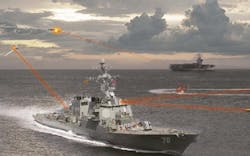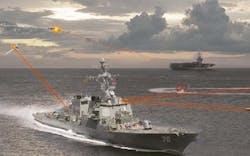Navy developing powerful laser weapons for front-line surface warships
By John Keller
WASHINGTON - U.S. Navy surface warfare experts are taking another step toward deploying powerful laser weapons aboard front-line Navy warships with a $150 million contract to the Lockheed Martin Laser and Sensor Systems segment in Bothell, Wash.
Lockheed Martin is developing a combination laser weapon and electro-optical dazzler to disable enemy optical sensors called HELIOS.
Officials of the Naval Sea Systems Command in Washington are asking Lockheed Martin Laser and Sensor Systems (formerly Lockheed Aculight) to develop a combination laser weapon and electro-optical dazzler to disable optical sensors called the High Energy Laser with Integrated Optical-Dazzler and Surveillance (HELIOS) system.
The HELIOS laser weapon and laser dazzler project ultimately could lead to deployment of this weapon, or a similar high-energy laser weapon, aboard late-model Navy Arleigh Burke-class destroyers starting in 2020 or shortly thereafter.
Details of the HELIOS system are classified secret. In fact, the project's full request for proposal, released last summer, was made available only to qualified bidders with promising laser weapons technologies and secret facilities.
The project seeks to develop a laser weapon for Flight IIA versions of the Burke-class destroyer. The weapon is expected to have at least 65 kilowatts of power, and will be integrated with a lower-power laser dazzler to disable intelligence, surveillance, and reconnaissance sensors. The laser's power ultimately could be increased to 100 or 150 kilowatts of power before widespread deployment aboard future Burke-class destroyers.
This contract award to Lockheed Martin calls for the company to design and build two HELIOS test units for delivery in 2020 - one unit for an operational destroyer surface warship, and the other for land-based testing. The contract has options that could increase its value to nearly a billion dollars ($942.8 million).
The HELIOS project is a natural outgrowth of the Navy's 30-watt AN/SEQ-3 Laser Weapon System (LaWS), which was installed in 2014 aboard the Navy's USS Ponce, an Austin-class amphibious transport dock ship, where it proved able to defend the ship from unmanned aerial vehicles, small boats, and other small targets.
Initial versions of HELIOS will have at least twice the laser power of LaWS, and the system's power is likely to be increased in the future to enable destroyers and other front-line surface warships to defend themselves against swarms of fast boats, manned and unmanned aircraft, sophisticated anti-ship missiles, and perhaps even from ballistic missiles. Late-model Burke destroyers are equipped with long-range missiles that can intercept and destroy ballistic missiles in various phases of flight.
The HELIOS project has a shadowy past. The Navy first called it Seasaber, then changed its name to Surface Navy Laser Weapon System (SNLWS), and finally changed the project's name again last summer to HELIOS.
While its predecessor LaWS was developed as a prototype to test the feasibility of laser weapons in the ocean environment, HELIOS is being developed from its inception as a full-fledged laser weapon for Navy surface combatants.
On this contract, Lockheed Martin Laser and Sensor Systems will do the work in Bothell, Wash.; Moorestown, N.J.; Owego, N.Y.; Marion, Mass.; Clearwater, Fla.; Manassas, Va.; Baltimore; and Akron, Ohio, and should be finished by April 2020.
For more information visit Lockheed Martin LaserandSensor Systems online at www.lockheedmartin.com/us/products/laser-sensor-systems.html.

